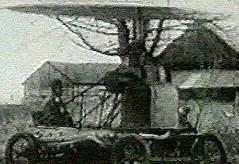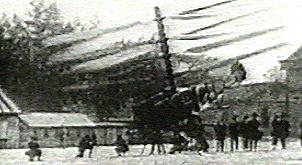1906 :
Crocco ( Italie )
- He discovered the cyclic
control of rotors
1907 :
Breguet - Richet gyroplane ( France )
13 Nov.
1907 :Paul Cornu
In France, the machine
of Paul Cornu was the first to take off with its
pilot and then made a free flight. Stabilised by wooden links
thanks to ground assistants, this machine suffered from instability, chronic
instability.
1911 :
Boris Yuriev ( Russia )
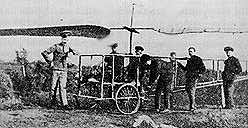
abtomat
perekosa ( collective pitch and automatic clutch ) the drawing with
main rotor and tail rotor
1912 :Ellehammer(
Danemark )
-
This machine powered by a star
motor of 36 HP cooled by air was very advanced for the age, but because
he was isolated his work was ignored and reinvented
later on by others...
-
1922 :
Geogrij de Bothezat ( URSS )
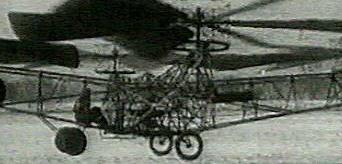
-
Build for the US Army Air Service
-
De Bothezat and James Rix
-
1924 :
Brennan ( England )
1924 : Emile
Berliner
1924 :
Pescara ( Argentina )
He worked out several
machines between 1919 and 1925 in Spain and France. A coaxial helicopter
weighting 850kg and flying at 13km/h was the first
machine controlled in collective pitch and cyclic.
1924 :
Etienne Oehmichen ( France )
The
first kilometer in closed circuit : 7 minutes, 40 seconds
Historical
time when Etienne Oehmichen took off
in presence of the aviation minister.
Photo Gunby
Photo Archive
1928 :
D'Ascanio ( Italy )
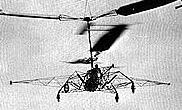
- Maximal altitude for a helicopter
: 18 m
-
1928 :
Hafner AR III / V ( Austria)
- Autogiros
evolved all the same during this time. However
they could neither climb or descend vertically nor staying in hover.
-
1920/36 :
Autogires Juan de la Cierva ( Spain )
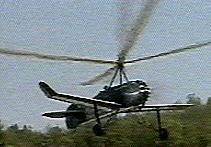
- The invention
of articulated rotor head with flapping blades made possible the development
of usable helicopters
-
1929 :
Kamov / Skrzhinskiif : Le KaSkr-I( URSS )
1929 :Pitcairn
1930 :
ZAGI 1A et le TsAGI , ( URSS )
The Aerodynamic
and Hydrodynamic Central Institute was created in 1928 by G. H. Sabinin. The ZAGI 1A that took off in August 1930 had a fuselage in soldered tubes,
a four bladed rotor driven by two 120HP motors vertically installed
Le
ZAGI 1A is the first dual motor helicopter
1931 :
L'autogire de Kuznetzov ( URSS )
1932 :
Kay
1932 :
Flettner FL 265 ( Germany )
1933 :
ZAGI 5EA ( URSS )
Its surprising machine
with three blades of 10m widespan fixed rigidly to the rotor mast was assisted
by three other blades of 7m widespan controlled in cyclic. Two additional
auxiliary rotors located front and rear managed the stability. The results
were unsuccessful and the complexity lead to give up the project.
1933 : Breguet
- Dorand ( France )
Louis Breguet
carried on his effort to build a coaxial machine powered by the famous
Wright motor of 420HP.
The
11th of September 1936 Louis Breguet reached the speed of 108km/h
1934 :
Le gyroplane A-7 de Nikolai Kamov ( URSS )
1935 :
Elton Whitney ( USA )
1936 :
Weir W.3 ( England )
1938 :Le
Page - Platt.

XR-1 ( 1941 / 1944 )
1939 :
Weir W.6
- - First
dual seats -
-
1939 :
Igor Sikorsky : le VS 300 (USA)
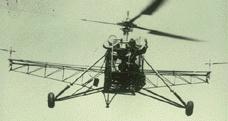
- The VS 300 of Igor Sikorsky
was the first usable helicopter. It was built
in small serie four years later (May 1943).

